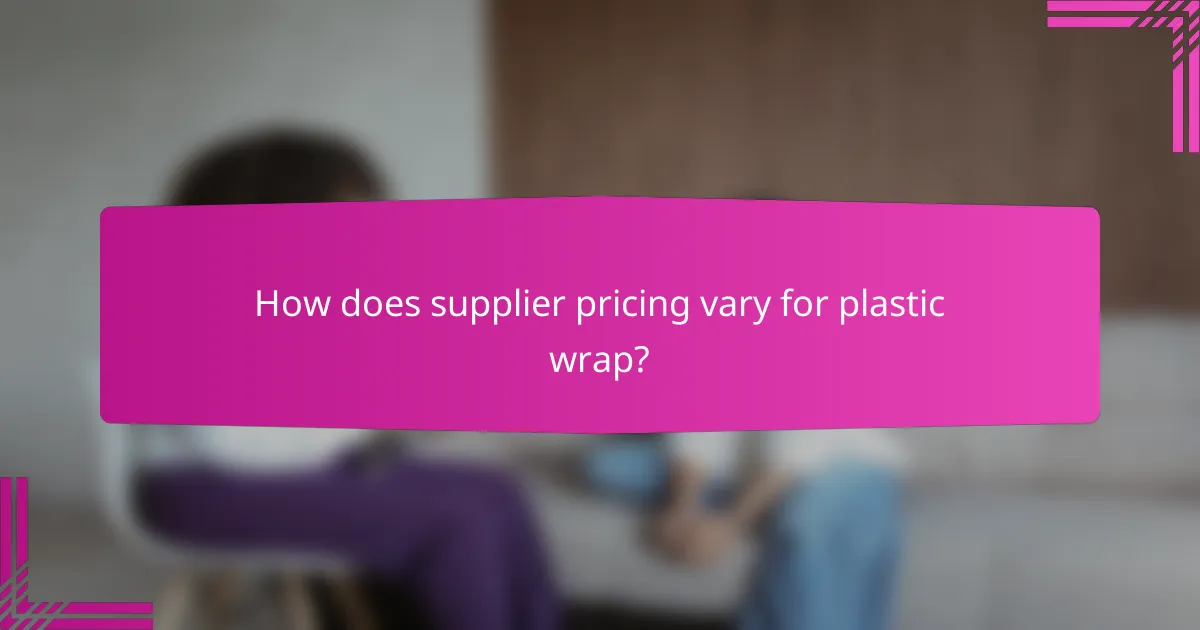Plastic wrap is available in a range of thicknesses tailored to meet diverse application needs, particularly in food preservation and protection. The choice of thickness is crucial for achieving optimal performance, while supplier pricing can vary based on factors such as material quality and order volume. By understanding these elements, consumers and businesses can make informed decisions when selecting the appropriate plastic wrap for their specific requirements.

What thickness variations are available for plastic wrap in New Zealand?
In New Zealand, plastic wrap comes in various thicknesses to suit different applications, ranging from standard to heavy-duty and specialty options. Choosing the right thickness is essential for ensuring optimal performance in food preservation and other uses.
Standard thickness options
Standard plastic wrap typically ranges from 20 to 30 microns in thickness. This option is suitable for everyday kitchen use, such as covering bowls or wrapping sandwiches. It provides a good balance between flexibility and durability, making it ideal for short-term food storage.
When selecting standard plastic wrap, consider the type of food being stored. For items that require a tighter seal, a thicker variant within this range may be preferable to prevent air exposure.
Heavy-duty thickness options
Heavy-duty plastic wrap usually measures between 30 and 50 microns thick, offering enhanced durability and puncture resistance. This type is ideal for wrapping meat, fish, and other items that require longer storage times or protection from freezer burn.
For best results, use heavy-duty wrap when preparing food for freezing or when you need to ensure a strong barrier against moisture and odors. It is often a bit more expensive than standard options but provides better protection.
Specialty thickness options
Specialty plastic wraps may vary significantly in thickness, often exceeding 50 microns, and are designed for specific applications such as industrial use or medical purposes. These wraps may include features like UV resistance or antimicrobial properties, catering to specialized needs.
When considering specialty wraps, assess the specific requirements of your application, such as temperature resistance or chemical exposure. These options can be more costly but are essential for ensuring safety and effectiveness in demanding environments.

How does supplier pricing vary for plastic wrap?
Supplier pricing for plastic wrap can differ significantly based on factors such as thickness, material quality, and purchase volume. Understanding these variations helps consumers and businesses make informed decisions when selecting plastic wrap for their needs.
Price ranges from local suppliers
Local suppliers typically offer plastic wrap at prices ranging from around $10 to $30 per roll, depending on the thickness and brand. Thinner wraps may be less expensive, while thicker, commercial-grade options can be on the higher end of the scale. Prices may also vary based on regional demand and availability.
Factors affecting pricing
Several factors influence the pricing of plastic wrap, including the type of material used, the thickness of the wrap, and the brand reputation. For instance, biodegradable or specialty wraps often come at a premium compared to standard polyethylene options. Additionally, seasonal demand can impact prices, with costs potentially rising during peak usage periods.
Bulk purchase discounts
Many suppliers offer discounts for bulk purchases of plastic wrap, which can lead to significant savings. Buying in larger quantities, such as cases of 12 or more rolls, often results in a price reduction of 10% to 20%. Businesses that use plastic wrap regularly should consider bulk buying to maximize cost efficiency.

What are the application needs for plastic wrap?
Plastic wrap is essential for various applications, primarily focused on food preservation, hygiene, and protection. Understanding the specific needs for each application helps in selecting the right type of plastic wrap, considering factors like thickness and durability.
Food storage applications
In food storage, plastic wrap is used to keep perishable items fresh by creating an airtight seal. It is particularly effective for covering bowls, wrapping sandwiches, and protecting leftovers. When choosing plastic wrap for food storage, consider thickness; thicker wraps generally provide better protection against moisture and odors.
Common thicknesses for food storage wraps range from 0.5 to 1.5 mils. For everyday use, a standard 0.75 mil wrap is often sufficient, while thicker options can be beneficial for items that require longer storage times.
Commercial kitchen uses
In commercial kitchens, plastic wrap plays a crucial role in maintaining food safety and organization. It is frequently used to cover food items during preparation and storage, ensuring compliance with health regulations. The ability to easily identify wrapped items is vital, so using clear plastic wrap is advisable.
For commercial applications, consider using thicker wraps, typically around 1.5 to 3 mils, as they are more durable and resistant to tearing. This is especially important in high-volume kitchens where efficiency and safety are priorities.
Industrial applications
Industrial applications of plastic wrap extend beyond food, including packaging and protecting various products during shipping and storage. Stretch film, a type of plastic wrap, is commonly used to secure pallets and protect goods from dust and moisture. The thickness of industrial wraps can vary significantly, often ranging from 3 to 10 mils, depending on the level of protection required.
When selecting plastic wrap for industrial use, consider the type of products being wrapped and the environmental conditions they will face. Thicker wraps provide better puncture resistance and are ideal for heavy or sharp items, while thinner options may suffice for lighter products.

What criteria should be considered when selecting plastic wrap?
Selecting plastic wrap involves evaluating thickness, material type, and cost-effectiveness to ensure it meets specific application needs. Understanding these criteria helps in choosing the right product for food preservation, packaging, or other uses.
Thickness suitability
The thickness of plastic wrap is crucial for its performance. Thicker wraps generally provide better durability and puncture resistance, making them suitable for heavier items or long-term storage. Typical thickness ranges from 0.5 to 2 mils, with thicker options often used in commercial settings.
For everyday use, a thickness of around 0.75 mils is usually sufficient for wrapping food items, while thicker wraps may be necessary for industrial applications. Consider the intended use to determine the appropriate thickness.
Material type
Plastic wraps are primarily made from polyethylene or PVC, each offering distinct advantages. Polyethylene wraps are more common for food storage due to their safety and flexibility, while PVC wraps provide better cling and transparency, making them ideal for display purposes.
When selecting a material, consider factors like food safety regulations and the specific requirements of your application. For instance, polyethylene is often preferred in kitchens, while PVC might be used in retail environments.
Cost-effectiveness
Cost-effectiveness is a key consideration when choosing plastic wrap, as prices can vary significantly based on thickness and material type. Generally, bulk purchases can lead to savings, especially for businesses that require large quantities.
Compare prices from different suppliers and consider the total cost of ownership, including durability and performance. Sometimes, investing in a slightly more expensive wrap can lead to better results and less waste in the long run.

What are the top brands of plastic wrap available in New Zealand?
The leading brands of plastic wrap in New Zealand include Glad, Cling Film by Alfoil, and Food Wrap by Biopak. Each brand offers unique features and thickness variations suited for different applications, making them popular choices for both home and commercial use.
Glad plastic wrap
Glad plastic wrap is known for its durability and excellent cling properties. It typically comes in various thicknesses, allowing users to choose the right option for their specific needs, whether for food storage or wrapping items for transport.
When using Glad plastic wrap, ensure that the surface is clean and dry for optimal adhesion. It is also microwave-safe, making it suitable for covering dishes during reheating.
Cling Film by Alfoil
Cling Film by Alfoil is another popular choice, renowned for its strong cling and versatility. This brand offers a thinner option that is ideal for wrapping sandwiches or covering bowls, providing a tight seal to keep food fresh.
One key consideration with Cling Film is its ease of use; it can be cut to size without tearing easily. However, it is not recommended for use in the microwave, so be mindful of its limitations when heating food.
Food Wrap by Biopak
Food Wrap by Biopak is an eco-friendly alternative made from biodegradable materials, appealing to environmentally conscious consumers. This brand provides a reliable seal while being less harmful to the environment compared to traditional plastic wraps.
When selecting Food Wrap by Biopak, consider its thickness, which may be slightly less than conventional wraps, making it better suited for light-duty applications. It is ideal for wrapping fruits and vegetables or covering dishes in the fridge.
